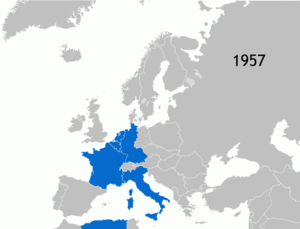Founding fathers of the European Union
Part of a series on the |
||||||||||||||||||||||
|---|---|---|---|---|---|---|---|---|---|---|---|---|---|---|---|---|---|---|---|---|---|---|
| History of the European Union |
||||||||||||||||||||||
 | ||||||||||||||||||||||
|
||||||||||||||||||||||
|
Organisation
|
||||||||||||||||||||||
|
||||||||||||||||||||||
|
||||||||||||||||||||||
|
Topics |
||||||||||||||||||||||
| European Union portal | ||||||||||||||||||||||
The Founding Fathers of the European Union are a number of men who have been recognised as making a major contribution to the development of European unity and what is now the European Union.
Europe's Founding Fathers
The European Union lists the following as its founding fathers:[1]
- Konrad Adenauer (Germany)
- Joseph Bech (Luxembourg)
- Johan Willem Beyen (Netherlands)
- Winston Churchill (United Kingdom)
- Alcide De Gasperi (Italy)
- Walter Hallstein (Germany)
- Sicco Mansholt (Netherlands)
- Jean Monnet (France)
- Robert Schuman (France)
- Paul-Henri Spaak (Belgium)
- Altiero Spinelli (Italy)
Other sources discuss fewer names.[2]
Proposals and Rome
Count Richard Coudenhove-Kalergi (1894–1972) published the paneuropa manifesto in 1923 which set up the movement of that name. At the start of the 1950s Robert Schuman (1886–1963), based on a plan by Jean Monnet (1888–1979), called for a European Coal and Steel Community in his "Schuman declaration". Monnet went on to become the first president of the High Authority. Schuman later served as president of the European Parliament and became notable for advancing European integration.[3]
Following on from its creation the Treaty of Rome established the European Economic Community. Although not all the people who signed the treaty are known as founding fathers, a number are such as Paul-Henri Spaak (1899–1972), who also worked on the treaty as well as the Benelux union and was the first President of the European Parliament.[3] Other founding fathers who signed the treaty were Konrad Adenauer (1876–1967) of Germany[4] and Joseph Bech (1887–1975) of Luxembourg.[5]
Others
Further men who have been considered founding fathers are: Giuseppe Mazzini (1805-1872) who founded the association "Young Europe" in 1834 with the vision of a united continent[6]; Victor Hugo (1802–1885) who made a speech where he called for United States of Europe in 1849 at the International Peace Congress of Paris, Winston Churchill (1874–1965) made although speech in Zürich in 1946 where he brought the idea of a Council of Europe (set up a few years later); Jacques Delors (born 1925), who was a successful Commission President in the 1980s and 90s; Sicco Mansholt (1908–1995), a Dutch minister and Commission President; Lorenzo Natali (1922–1989); Mário Soares (born 1924), Portuguese Prime Minister at the time Portugal acceeded the EC; Altiero Spinelli (1907–1986), an Italian active in the resistance and European federalists movement who became a prominent MEP and Commissioner; and Pierre Werner (1913–2002) a Prime Minister of Luxembourg.[4]
See also
- History of the European Union
- President of the European Commission
- President of the European Parliament
- List of presidents of the institutions of the European Union
References
- ↑ "The Founding Fathers of the EU". European Union. Retrieved 2013-03-29.
- ↑ Smets, Paul F.; Ryckewaer, Mathieu, eds. (2001). Les pères de l'Europe: 50 ans après : perspectives sur l'engagement européen : actes du Colloque international des 19 et 20 mai 2000, Bruxelles, Palais d'Egmont Bibliothèque de la Fondation Paul-Henri Spaak [The Founding Fathers of Europe: 50 Years on: Perspectives on European Integration: Proceedings of the International Symposium on 19 and 20 May 2000, Brussels, Egmont Palace Library, Paul-Henri Spaak Foundation] (in French). with the support and cooperation of the Paul-Henri Spaak Foundation. Emile Bruylant. ISBN 9782802714439.
Bossuat, G. (2001). Les Fondateurs de l'Europe Unie [The Founders of European Unity] (in French). Belin. ISBN 978-270112962-4. - ↑ 3.0 3.1 Founding Fathers: Europeans Behind the Union
- ↑ 4.0 4.1 European Audio Visual Service - Founding Fathers
- ↑ Dumont, Patrick and Hirsh, Mario (2003). "Luxembourg". European Journal of Political Research 42 (7–8): 1021. doi:10.1111/j.0304-4130.2003.00129.x.
- ↑ Mack Smith, Denis (1994). Mazzini. Yale University Press. pp. 11–12.
| ||||||||||||||||||||||||||||||||||||||||||||||||||||||||||||||